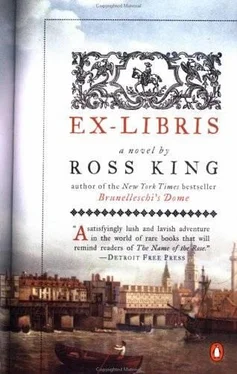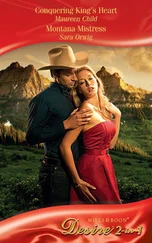I was startled, therefore, when who should open the door but Phineas Greenleaf himself. He betrayed no signs of recognition, which I found odd given that we had spent six days on the road together and shared a number of humiliatingly intimate bedrooms. He merely widened the aperture enough for me to slip through and then ushered me down a corridor to what seemed like a drawing-room, dark on account of the yew-green curtains.
'If you would wait here, sir.'
I listened as he ascended an invisible staircase and then creaked across the floor above me. Events seemed to be replicating themselves in some disturbing and anticlimactic pattern. That first night in the library at Pontifex Hall he had left me alone, just so, and shuffled up the staircase in search of his mistress. So I was not unduly surprised when I saw that I had not been led into a drawing-room after all. Once again Phineas had left me stranded in the middle of a library. Or in the middle of what in some happier incarnation had been a library. The rows of shelves had been denuded, picked clean of their books, and even a number of shelves were missing. Burned as firewood, I wondered, by a regiment of Cromwell's soldiers? But a few of the house's other furnishings had been spared the holocaust or pillage, for there was a moth-ravaged tapestry on one of the walls and a marble-and-slate fireplace with tongs and firedogs arranged before it. Four padded chairs had been quadrated round a small rosewood table.
Yet the library was not quite empty of books. In the dim light I spied a pile of fat volumes arranged on the table-books that I supposed Alethea must have brought with her in the hope of whiling away the hours on the coach. I creaked open the cover of the one on top, fully expecting to see Sir Ambrose's ex-libris stamped on the pastedown. But straight away I saw that the volume was much newer than any of those at Pontifex Hall, as were its three fellows. I could smell the tawed leather of their bindings.
New books? I was surprised by the discovery. What on earth could the mistress of Pontifex Hall want with yet more books? I was sitting in one of the chairs now, riffling the leaves of the first volume with a mixture of curiosity and guilty pleasure. What choice texts, I wondered, might she have brought with her? Learned tomes like Ficino's translations of Plato or Hermes Trismegistus? Or volumes on witchcraft, or perhaps even necromancy?
But each of them covered more mundane territories, ones hardly preferable, in my opinion, to the company of the dour and surly Phineas Greenleaf. I frowned at the title-pages as I plucked up the volumes and then replaced them. All were on matters pertaining to the business of wills and property law. The names were familiar enough, but never had I troubled myself to open one of them, let alone to read as much as a page. Yet here, with a bookmark fully three-quarters of the way through, was Hobhouse's A Treatise of Testaments and Last Wills , while beneath it sat Blackacre's notoriously dull A Touchstone of Property and Conveyances . Its pages had been cut all the way to the bitter end, as had those in the third volume, Phillimore's gargantuan Equity Law and the Practice of the Court of Chancery . Only the last book seemed in keeping with the Lady Marchamont I thought I knew: a volume entitled The Law's Resolution of Women's Rights . Its pages too had been cut from front to back, while the notes scratched in the margin were composed in a familiar hectic scrawl.
By now a light tread was squeaking across the ceiling overhead. I replaced the last volume and sat back in the chair, aching with exhaustion. I had still not recovered either from my exertions-I had spent most of the morning and a good part of the afternoon in Alsatia-or from the shock of my discovery. I scrubbed my palms across my cheeks and brow, then took a couple of deep gulps as if drinking the dense, mulled air of the room from a heavy gourd. I fished the copy of Agrippa's Magische Werke carefully from my pocket and placed it on the table next to the other books. Yes, I had come far today. I had learned much.
Closing my eyes, I heard the soft outcry of treads and risers as Alethea descended the staircase. I sat back to await her arrival. How much, I wondered, ought I to tell her?
***
I had left for Alsatia early that morning, this time travelling upriver by sculler. Arrowsmith Court, when I finally found it, proved exactly the kind of place in which I would have expected Pickvance to conduct his unsavoury trade: a small patch of mud-slimed cobbles round three sides of which a number of sooty tenements pressed four and five storeys upwards. A clowder of scrawny cats was busy in a heap of fishbones, while a couple of others groomed themselves in doorways and on window-sills. Last night's rain had collected in turbid pools and already stank like bilgewater. As I picked my way round them a chamber-pot was emptied from one of the upper windows. I leapt sideways in the nick of time. Yes, I thought ruefully: I had come to the right place.
The Saracen's Head stood directly opposite the courtyard's narrow, arched entrance. A swarthy, moustachioed face, its expression fierce and implacable, peered back at me from a signboard above the door. The tavern itself appeared to be closed. A tobacconist's stood to one side of it, a shop of more ambiguous designation on the other, both were also shut tight, their bottle-glass windows bleared with dirt and soot. Beside the tobacconist's door stood another, smaller door, whose tarnished amuel-and-brass sign read: 'Dr. Pickvance-Bookseller Auctioneer'.
After pulling a fraying bell-rope I was admitted with much furtiveness and then conducted up five flights of stairs by Mr. Skipper, who explained that Dr. Pickvance was otherwise engaged, but that he, Mr. Skipper, would be honoured to assist. The 'offices', from what I was allowed to see of them, consisted of a single room furnished with two desks, a pair of chairs, and what looked to be the tools of a bookbinder's trade: a stack of sheepskins and a beating-stone in a far corner, together with an assortment of gimlets, sewing-presses and polishing irons littered across the rest of the room. There was also a printing-press, an enormous mechanical beast to which Mr. Skipper repaired after sitting me at one of the desks. On the desk sat a pile of perhaps two dozen catalogues bound in greasy brown leather.
'Good luck to you,' he murmured with a morose smile, then turned his back, I suppose to begin cobbling together more 'masterpieces' for Pickvance's next auction. I picked up the first of the volumes and opened its cover.
As I read through the catalogues for the next eight hours, nourished only by an unappetising rabbit pie fetched by Mr. Skipper from a cookshop, a few facts about the mysterious Dr. Pickvance gradually began taking shape. I was able to determine that he conducted his auctions roughly twice a year, going back as far as 1651, the year when the Civil War ended and the Blasphemy Act passed through Parliament. All of the auctions must have been as clandestine as the one in the Golden Horn, because all had been conducted in Alsatia, roughly half in the Golden Horn, the others scattered among a handful of nearby taverns and alehouses, including two or three in the Saracen's Head. The works auctioned had been of a piece, it seemed, with those sold in the Golden Horn, and some of the auctions had comprised as many as 500 lots. The catalogues listed each work's author, title, date of impression, style of binding, number of pages and illustrations, general condition, and, finally, provenance. I was encouraged by this last detail. I noticed how Pickvance or some amanuensis had recorded not only the name of whoever put the lot up for auction but also that of whoever had purchased it.
Читать дальше












